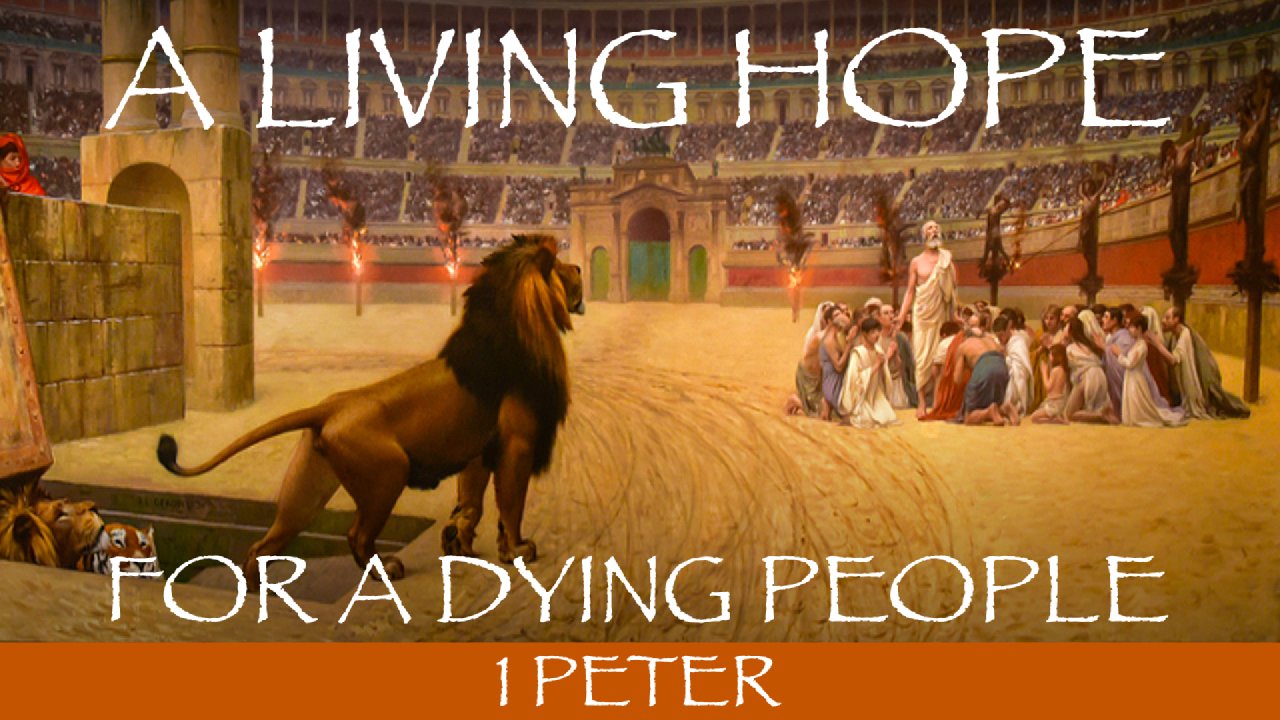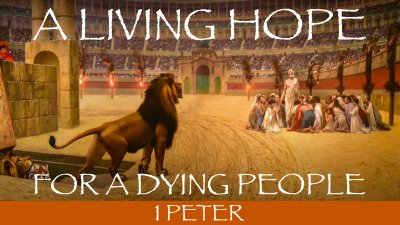To feel good or to be good. That is the question.
Ask yourself, how do you feel when you are told to “obey(!)”? Do you gladly receive the instruction with thanksgiving for the chance to be obedient? Or do you question the command and look for a way to do it on your own terms? Of course, there are examples of commands that are truly immoral, but why is it that we are so averse to obedience?
In Scripture, obedience to God and to his law are presented as the way of blessing and life. Disobedience is the way of cursing and death. Today, it seems to be the reverse. Rebellion is cool and obedience is, well, boring.
It reveals something about human nature that our hearts are inclined to obeying our desires and not the commands of others. By God’s common grace, we often find a match between God’s will and our own. But what happens when we do not? Are we compelled by what feels good or by what is good? And what does Scripture say about it?
This Sunday, we will engage this question as 1 Peter calls us obedient children who pursue God’s holiness. To prepare you for Peter's message, I must say that none of us are naturally disposed to obey his words, or the words of others. Rather, we are inclined by our human natures and taught by our American culture to see obedience as a burden and not a blessing. Yet, God’s Word says something else and God’s gospel actually accomplishes something else—namely, the new birth of obedient children.
So, let’s pray for God’s Word to give us a new (creation) desire for obedience. In preparation for Sunday, take time to read 1 Peter 1 and pray that God’s living words would have their full effect in our lives. We need our hearts and minds renewed by truth, and this Sunday we have a wonderful chance for that to happen.
I look forward to seeing you Sunday, as God allows, as we gather to worship Christ and proclaim the good news that God forgives our disobedience and makes us obedient children.
For His Glory and your joy,
Pastor David
--------------------------------------------------------------------------------------------------------
Discussion & Response Questions
1 Peter 1:13-19
1. What is the main point of this passage? How do we see that?
2. What does 1 Peter 1:13-19 reveal about the identity of the church?
3. What is the new identity Peter wants his recipients to have and hold?
4. How does Peter use the Old Testament to form identities? How does that apply today?
5. What role does thinking play in the life of a Christian?
6. What is the difference between what Peter is saying and just having a good self-image?
7. What do we learn about the character of God in this passage?
8. How should the church respond to the following realities?
- “The grace that will be brought to you at the revelation of Christ” (v. 13)
- The holiness of God “who called you” (vv. 14-15)
- Identity as children (v. 14) in relationship to the Father (v. 17)
- “The time of your exile” (v. 17)
- The imperishable and “precious blood of Christ” (v. 19).
9. Is there anything that you should apply to your life?

5. Live Not By Feelings: Three Ways to Love and Live (1 Peter 1:13-19)
Sermon
March 7, 2021 • David Schrock
19. Mission Accomplished: Grace from Beginning to End (1 Peter 5:5-15)
June 27, 2021 • David Schrock • 1 Peter 5:5–14
In John 1:14–18, the beloved apostle describes the grace of the law and the greater grace of the gospel as “grace upon grace". And in his opening words to his Gospel, he explains that grace and truth are now found in the person and work of Jesus Christ, the Lord Incarnate. At the end of Peter’s letter, the same emphasis on grace is seen. Only the largesse of God’s grace is not found in redemptive history, but in the church’s personal experience of grace. Throughout Peter’s letter, the restored apostle has testified to the true grace of God that is found ready to aid all those who are born again by the Spirit. Even more, Peter has explained the sufferings of Christ’s followers in terms of the sanctifying grace that accompanies such fiery trials. Knowing this grace strengthens believers to follow Christ fully. And this Sunday, as we come to the end of 1 Peter, we will conclude our sermon series by considering all that Peter says about grace in 1 Peter 5:5–14. As you have time, please read 1 Peter 5 to prepare for Sunday. You may also find help in reading James 4 or Proverbs 3 in preparation for worship. Pray that God would continue to lavish his grace upon us, as we cast our cares on him and find fresh mercies to follow him fully. I look forward to seeing you Sunday and to worshiping the true God of grace with you. For His Glory and your joy, Pastor David -------------------------------------------------------------------------------------------------------------------------------------------------------------- Discussion & Response Questions for 1 Peter 5:5-14 1. Why should humility be a distinctive mark of the church? 2. How is humility to appear in our relationship to elders, to one another, and to God? (vv. 5-7) 3. The Greek word for “opposes” (v. 5) and “resist” (v. 9) is identical. What does this teach us about humility, pride, and spiritual warfare? 4. How are prayerfulness (v. 7) and faith (v. 9) connected to humility? 5. What is the role of humility when it comes to resisting the devil? 6. What truths should the church remember when they suffer persection? 7. What promises and words of encouragement and assurance does Peter give to the church? (vv. 5, 6, 7, 10) 8. Look for the repetition of grace in this text (vv. 5, 10, 12). How does this instruct us? 9. Practically, what does it look like to stand firm in the gospel? How might we grow in standing firm? 10. How might this text shape our resolve as Christians?
18. Good Shepherds: 7 Marks of a Faithful Under-Shepherd (1 Peter 5:1-4)
June 20, 2021 • David Schrock • 1 Peter 5:1–4
Forbes Magazine lists 100 Quotes on Leadership. When bookstores used to be brick and mortar, you could always find a leadership section. And aspiring leaders may spend (tens of) thousands of dollars each year on coaching, conferences, and other ways to become better leaders. In the Bible, we also find a lot about leadership. But what we don’t find are leadership techniques. Instead, we find offices like prophet, priest, king, and shepherd. We discover that the greatest leader laid his life down for those whom he loved. And in Christ and those who followed him, we are given a vision of what a leader is. We also find many examples of bad leaders too. Simultaneously, in both testaments, we find lists of qualifications for leaders (see Exodus 18, Deuteronomy 17–18; 1 Timothy 3; and Titus 1). These lists are always based on character, and if anyone wants to be a leader in the church, they must look to God’s standards. This Sunday, we will do just that. Writing to a suffering church, Peter addresses the lead sufferers, the shepherds who are leading the sheep. In less than five verses, we will discover in 1 Peter 5:1–5, a host of characteristics that you should recognize in those who lead the church. And current and aspiring leaders should be able to test themselves by these verses too. To prepare for Sunday, please read 1 Peter 5. You will also be helped if you read Ezekiel 34 and John 10. These two background passages will give you the biblical context for Peter’s words, as they show what a good shepherd is and is not. After spending a week with a flock of shepherds at the SBC this week, I am glad to be with you and to be one of your shepherds. It is one of the greatest joys in my life. And as we come to the text of 1 Peter 5, let us pray that the Chief Shepherd, Jesus Christ, will continue to shepherd us as we hear his voice and follow his lead. See you Sunday (DV). For His Glory and your joy, Pastor David ---------------------------------------------------------------------------------------------------------------------------------------------- Discussion & Response Questions for 1 Peter 5:1-5 1. What is significant about how Peter describes his identity? How does this set the tone for this exhortation? 2. How does Peter describe the work of an elder? 3. What qualifications does Peter give for the motives of elders in their ministry? 4. What is the difference between an elder, a shepherd, and an overseer? What nuances do these words give in describing the same office? 5. “that is among you.” What does this say about the work of shepherding? 6. How does willingness, eagerness, and living as an example bless the flock? 7. What are some of the differences between a good shepherd and a not-so-good shepherd? (See also Ezekiel 34 and John 10) 8. How do wrong motives distort the work of pastoral ministry and damage the church? 9. How does Peter describe Christ? 10. What is the elders’ responsibility to Christ? 11. What does this text reveal about hierarchical relationships in the church? 12. What exhortation does Peter give to the congregation? What exhortation and caution does Peter give to both the elders and the congregation? 13. How should we respond to God’s design for the church? 14. How should we respond to these promises of grace and glory?
17. Preparing Our Head, Heart, and Hands for the End of the World (1 Peter 4:12-19)
June 13, 2021 • David Schrock • 1 Peter 4:12–19
Chicken little said the sky is falling and it seems many Christians say the same when they think about current events and the end of the world. But is that how the Bible speaks about the end of the world? This Sunday we will consider the end of the world and the grace of God which purifies us through the fiery trials that God has prepared for us. As you prepare for Sunday, take time to read 1 Peter 4:12-19. But also read over 1 Peter and consider the ways Peter talks about the end. This will help you to see what we all will see in 1 Peter 4:12-19 this Sunday. As I write this from Indianapolis where I am teaching eschatology, I can’t wait to get home and worship our risen Lord with you. May the exalted Christ be praised in our assembling. For His glory and your joy, Pastor David ----------------------------------------------------------------------------------------------------- Discussion & Response Questions for 1 Peter 4:12-19 1. Does persecution and suffering seem like a stranger to you? Instead of being surprised by sufferings, what does it look like for us to be surprised by joy? 2. Does rejoicing, gladness, and blessing come to mind when facing suffering? 3. How does Peter reassure and encourage the church? 4. Consider Peter’s command to glorify God (v. 16). Might one be tempted to be ashamed? See Acts 5:40-42. 5. What does it mean that judgment begins at the house of God? Why does Peter insert this warning? (vv. 17-19) How should we respond to this? 6. What does it mean to “obey the gospel of God”? 7. How does Peter teach them to suffer (v. 19)? What is the sufferer to do? Consider Psalm 31:5; Luke 23:46.





